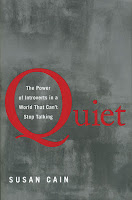I am an introvert.
Okay, so perhaps there are no Introverts Anonymous groups — after all, who would show up? — but there is definitely a tendency in Western culture to pathologize introversion and champion extroversion.
More on that in a moment, but first, let's go over the definitions of 'introvert' and 'extrovert', just so we're all on the same page:
introvert: "1 Psych. a person predominantly concerned with his or her own thoughts and feelings rather than with external things. 2 a shy, inwardly thoughtful person (compare extrovert)"
extrovert: "1 Psych. a person whose thoughts and interests are predominantly concerned with things outside the self. 2 an outgoing or sociable person (compare introvert)"
- from the Canadian Oxford English Dictionary
From this, it looks like there's a distinction between the meaning of "introvert" and "extrovert" when used in a particular discipline (psychology/psychiatry), and when used colloquially by the general public. The second definition of each word may be the one that most people associate with these terms, but personally, I think the first definition is more on the mark. It's very straightforward, and it doesn't use adjectives that muddy the waters.
For instance, in contrasting the second definitions of each of these terms, we might assume that introverts just aren't sociable, or that extroverts don't think deeply. These are blanket generalizations that I'd argue only serve to pit one of these personality types against the other. Introverts certainly can be sociable (I love hanging out with my friends!), and I'm sure extroverts can be introspective when they feel like it. Furthermore, the words "shy" and "outgoing" have connotations in Western culture — the former with a negative sense, the latter with a positive.
I believe that the distinction that should be drawn between these two is not of ambiguous adjectives describing personality, but rather the answer to a simple question: how does an individual "re-charge"? By and large (and yes, this is another generalization, albeit a more useful one), introverts re-charge by spending time by themselves; extroverts re-charge by spending time with people. (For specifics on this, check out this Psychology Today article.)
Really, if you think about it, introversion and extroversion are just two different ways to re-energize oneself —with neither one being superior to the other (although certain situations may favour one method over the other). So why are introverts treated like they need to be "fixed"?
It's been my experience that if you're an introverted kid, people wonder what's wrong with you. "Why is she so shy? How come he doesn't like socializing with the others?" Teachers describe you as "shy" and "quiet" and ask your parents to encourage you to speak up more in class.
If you're an extroverted kid, you're in the clear. No one says, "I wish she wouldn't be so outgoing!" or "Why can't he keep his opinions to himself?" (Unless the individual is so outgoing he/she is disrupting the rest of the class, but then there's probably something else, beyond personality traits, going on.)
We see it in YA books and teen movies all the time. There's the "shy" protagonist, usually a girl, who through the help of a guidance counselor/a surprising friendship/a newfound connection with horses/etc. "blossoms," coming out of her "shell" and garnering a large group of friends who all adore her, and usually a boyfriend too.
 |
| In Grease, shy Sandy tries to be a whole lot more outgoing in order to get the guy — and she succeeds. |
It's rare. (If you can think of a book that demonstrates this, let me know!)
What this trend is telling teens, then, is that they should try to be more outgoing, make more friends, step outside their "comfort zone," in order to become who they're supposed to be. It's telling teens that being introverted is a bad thing, a lesser thing, than being extroverted. That extroversion is what they should be aiming for.
 And that INFURIATES me. Introversion has its own and equal advantages to extroversion — just different ones. For instance, extroversion may be positively correlated with job salaries, promotion, and satisfaction with career, but introverts often make better leaders. For an in-depth look at what introversion brings to the table, I'd highly recommend checking out Susan Cain's Quiet: The Power of Introverts in a World That Can't Stop Talking.
And that INFURIATES me. Introversion has its own and equal advantages to extroversion — just different ones. For instance, extroversion may be positively correlated with job salaries, promotion, and satisfaction with career, but introverts often make better leaders. For an in-depth look at what introversion brings to the table, I'd highly recommend checking out Susan Cain's Quiet: The Power of Introverts in a World That Can't Stop Talking. I'd like to see some YA where an introvert learns to embrace that quality of themselves, rather than trying to push themselves to be someone they just aren't. A YA story where introverted qualities are appreciated — where they help the girl to get the guy (or vice versa).
And most of all, I'd like to see the popular North American attitude of valuing extroversion over introversion die. I know, it's a tall order.
Now, if you'll excuse me, I'm off to meet up with a friend. She's an extrovert, I'm an introvert, but we both love YA — and that means we never run out of things to talk about.


